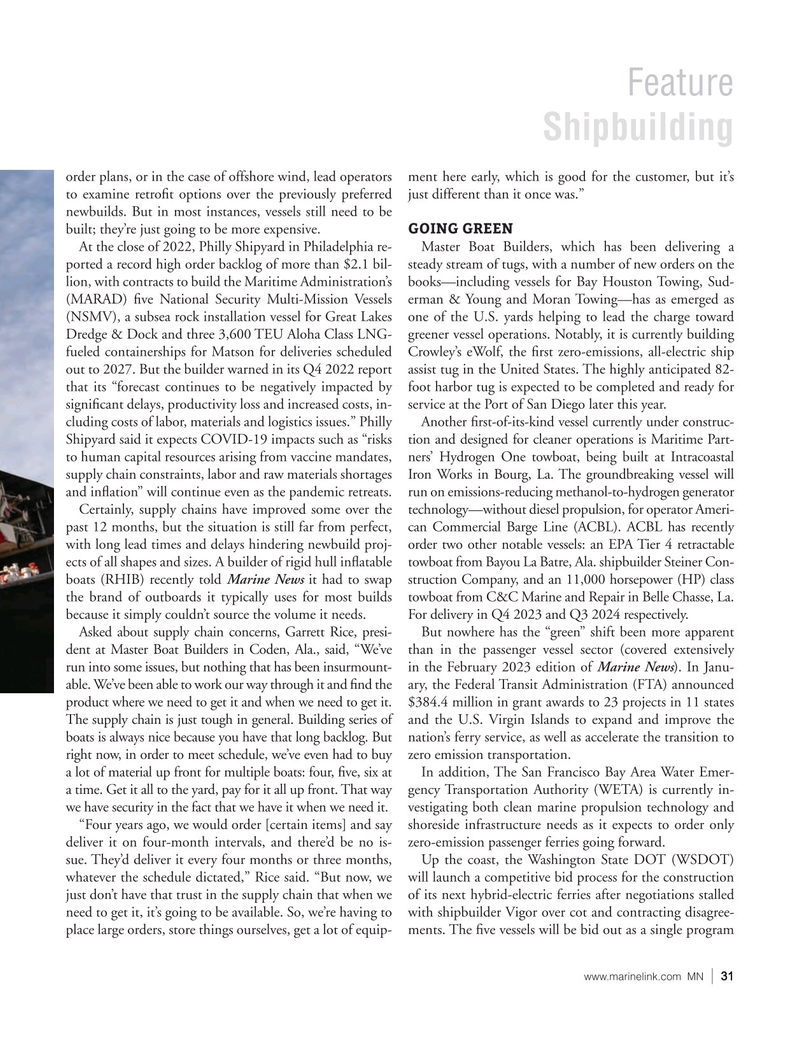
Page 31: of Marine News Magazine (April 2023)
Towboats, Tugs & Barges
Read this page in Pdf, Flash or Html5 edition of April 2023 Marine News Magazine
Feature
Shipbuilding order plans, or in the case of offshore wind, lead operators ment here early, which is good for the customer, but it’s to examine retro? t options over the previously preferred just different than it once was.” newbuilds. But in most instances, vessels still need to be built; they’re just going to be more expensive. GOING GREEN
At the close of 2022, Philly Shipyard in Philadelphia re- Master Boat Builders, which has been delivering a ported a record high order backlog of more than $2.1 bil- steady stream of tugs, with a number of new orders on the lion, with contracts to build the Maritime Administration’s books—including vessels for Bay Houston Towing, Sud- (MARAD) ? ve National Security Multi-Mission Vessels erman & Young and Moran Towing—has as emerged as (NSMV), a subsea rock installation vessel for Great Lakes one of the U.S. yards helping to lead the charge toward
Dredge & Dock and three 3,600 TEU Aloha Class LNG- greener vessel operations. Notably, it is currently building fueled containerships for Matson for deliveries scheduled Crowley’s eWolf, the ? rst zero-emissions, all-electric ship out to 2027. But the builder warned in its Q4 2022 report assist tug in the United States. The highly anticipated 82- that its “forecast continues to be negatively impacted by foot harbor tug is expected to be completed and ready for signi? cant delays, productivity loss and increased costs, in- service at the Port of San Diego later this year.
cluding costs of labor, materials and logistics issues.” Philly Another ? rst-of-its-kind vessel currently under construc-
Shipyard said it expects COVID-19 impacts such as “risks tion and designed for cleaner operations is Maritime Part- to human capital resources arising from vaccine mandates, ners’ Hydrogen One towboat, being built at Intracoastal supply chain constraints, labor and raw materials shortages Iron Works in Bourg, La. The groundbreaking vessel will and in? ation” will continue even as the pandemic retreats. run on emissions-reducing methanol-to-hydrogen generator
Certainly, supply chains have improved some over the technology—without diesel propulsion, for operator Ameri- past 12 months, but the situation is still far from perfect, can Commercial Barge Line (ACBL). ACBL has recently with long lead times and delays hindering newbuild proj- order two other notable vessels: an EPA Tier 4 retractable ects of all shapes and sizes. A builder of rigid hull in? atable towboat from Bayou La Batre, Ala. shipbuilder Steiner Con- boats (RHIB) recently told Marine News it had to swap struction Company, and an 11,000 horsepower (HP) class the brand of outboards it typically uses for most builds towboat from C&C Marine and Repair in Belle Chasse, La. because it simply couldn’t source the volume it needs. For delivery in Q4 2023 and Q3 2024 respectively.
Asked about supply chain concerns, Garrett Rice, presi- But nowhere has the “green” shift been more apparent dent at Master Boat Builders in Coden, Ala., said, “We’ve than in the passenger vessel sector (covered extensively run into some issues, but nothing that has been insurmount- in the February 2023 edition of Marine News). In Janu- able. We’ve been able to work our way through it and ? nd the ary, the Federal Transit Administration (FTA) announced product where we need to get it and when we need to get it. $384.4 million in grant awards to 23 projects in 11 states
The supply chain is just tough in general. Building series of and the U.S. Virgin Islands to expand and improve the boats is always nice because you have that long backlog. But nation’s ferry service, as well as accelerate the transition to right now, in order to meet schedule, we’ve even had to buy zero emission transportation.
a lot of material up front for multiple boats: four, ? ve, six at In addition, The San Francisco Bay Area Water Emer- a time. Get it all to the yard, pay for it all up front. That way gency Transportation Authority (WETA) is currently in- we have security in the fact that we have it when we need it. vestigating both clean marine propulsion technology and “Four years ago, we would order [certain items] and say shoreside infrastructure needs as it expects to order only deliver it on four-month intervals, and there’d be no is- zero-emission passenger ferries going forward.
sue. They’d deliver it every four months or three months, Up the coast, the Washington State DOT (WSDOT) whatever the schedule dictated,” Rice said. “But now, we will launch a competitive bid process for the construction just don’t have that trust in the supply chain that when we of its next hybrid-electric ferries after negotiations stalled need to get it, it’s going to be available. So, we’re having to with shipbuilder Vigor over cot and contracting disagree- place large orders, store things ourselves, get a lot of equip- ments. The ? ve vessels will be bid out as a single program www.marinelink.com MN 31|

 30
30

 32
32
